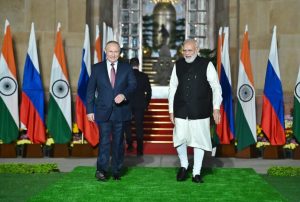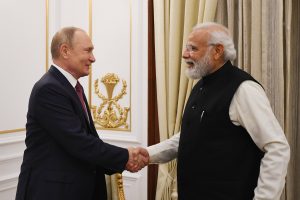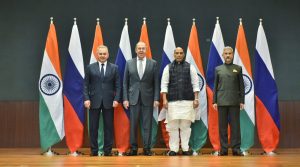
Raising the bar high for their special and privileged strategic partnership, India and Russia signed 28 agreements, including a Make in India deal on jointly manufacturing assault rifles and decided to intensify cooperation in shaping an inclusive Afghanistan, free from terror.
Defence cooperation, the strongest pillar of the India-Russia strategic partnership, scaled new heights as the two sides signed an agreement on the programme for defence cooperation during 2021-31 and sealed a deal for India’s procurement of over 600,000 AK-203 assault rifles under a new joint venture in Uttar Pradesh.
The annual summit meeting between Prime Minister Narendra Modi and Russian President Vladimir Putin in New Delhi on December 6 was marked by effusive expressions of mutual support and solidarity by the two leaders amid a shifting global geopolitical environment.

With President Putin at his side, PM Modi said the India-Russia friendship has “remained a constant” despite many fundamental changes in the world. The two countries cooperated closely while paying attention to each other’s sensitivities, he said. President Putin, who has helmed India-Russia partnership for over two decades, lauded India as a “great power” and a time-tested friend.
The Russian leader also highlighted the special nature of India-Russia military partnership, which has been transformed from a buyer-seller relationship into one of co-manufacturing and co-development. Russia works with India in the military-technical field “in a way that we do not work with any of our partners,” he said.
The talks in New Delhi also saw the two sides focus on scaling up their economic relations which have remained way below potential. The two sides have set a target of increasing bilateral trade to $30 billion and bilateral investments to $50 billion by 2025. The leaders discussed ways to enhance economic cooperation, including through long-term procurement of essential commodities from Russia, elimination of trade barriers, and connectivity options such as the International North South Trade Corridor and the Chennai-Vladivostok maritime corridor. The two countries also decided to explore long-term cooperation and arrangements for energy, inland waterways, civilian shipbuilding, fertilisers, steel, coking coal, and supply of skilled manpower.
The situation in Taliban-ruled Afghanistan featured prominently in discussions. The two sides will work for a peaceful, secure and stable Afghanistan with an inclusive government representing all sections of society, said Foreign Secretary Harsh Shringla. “Both sides were also very clear that Afghanistan’s territory should not be used for sheltering, training, planning or financing any acts of terrorism,” Mr Shringla said.
There was a lot of emphasis on counterterrorism, an area of common interest, and a “joint sense” on dealing with terrorist entities active in the neighbourhood, such as Islamic State, al Qaeda and Lashkar-e-Taiba (LeT), Shringla said. Both sides stressed the need to address cross-border terrorism, sought action against UN-designated terror groups, and called for strengthening the Financial Action Task Force (FATF) and the UN office for counterterrorism, he added.
“Both sides strongly condemned terrorism in all its forms and manifestations and urged the international community to intensify cooperation against terrorism including safe havens, terror financing, arms and drugs trafficking, radicalisation and malicious use of ICTs to spread extremist, terrorist and other illegal content,” said a joint statement after the talks. In a boost for India’s fight against Pakistan-sponsored cross-border terror, the joint statement specifically referred to Islamic State, al Qaeda and LeT in the context of preventing Afghan soil from being used for terrorist activities, and called for ensuring that “Afghanistan would never become a safe haven for global terrorism”.

The annual summit meeting was preceded by the maiden 2+2 dialogue between defence and foreign ministers of India, in which military cooperation, the Indo-Pacific and the situation in Afghanistan figured in discussion.
Russian Foreign Minister Sergey Lavrov, a vocal critic of India’s Indo-Pacific strategy, however, lauded New Delhi for demonstrating strategic autonomy by going ahead with implementation of the India-Russia deal for S-400 air defence systems despite US attempts to “undermine this cooperation”. In an interaction with the media, Mr Lavrov added that the Russian side raised its concerns about “Indo-Pacific strategies” and “non-inclusive blocs” such as AUKUS during the talks.
Author Profile

- Manish Chand is Founder and Editor-in-Chief of India Writes Network (www.indiawrites.org) and India and World, a pioneering magazine focused on international affairs. He is CEO, Centre for Global India Insights, an India-based think tank focused on global affairs.
Latest entries
 India and the WorldFebruary 17, 2026South-by-South: Focus on people-centric solutions at India AI summit
India and the WorldFebruary 17, 2026South-by-South: Focus on people-centric solutions at India AI summit India and the WorldFebruary 7, 2026Modi hails interim India-US trade deal, Goyal says no concessions made on agriculture
India and the WorldFebruary 7, 2026Modi hails interim India-US trade deal, Goyal says no concessions made on agriculture India and the WorldFebruary 2, 2026Trump announces trade deal with India, Modi ‘delighted’
India and the WorldFebruary 2, 2026Trump announces trade deal with India, Modi ‘delighted’ India and the WorldJanuary 31, 2026Palestinian minister bats for mediatory role for India in ending Gaza conflict
India and the WorldJanuary 31, 2026Palestinian minister bats for mediatory role for India in ending Gaza conflict







